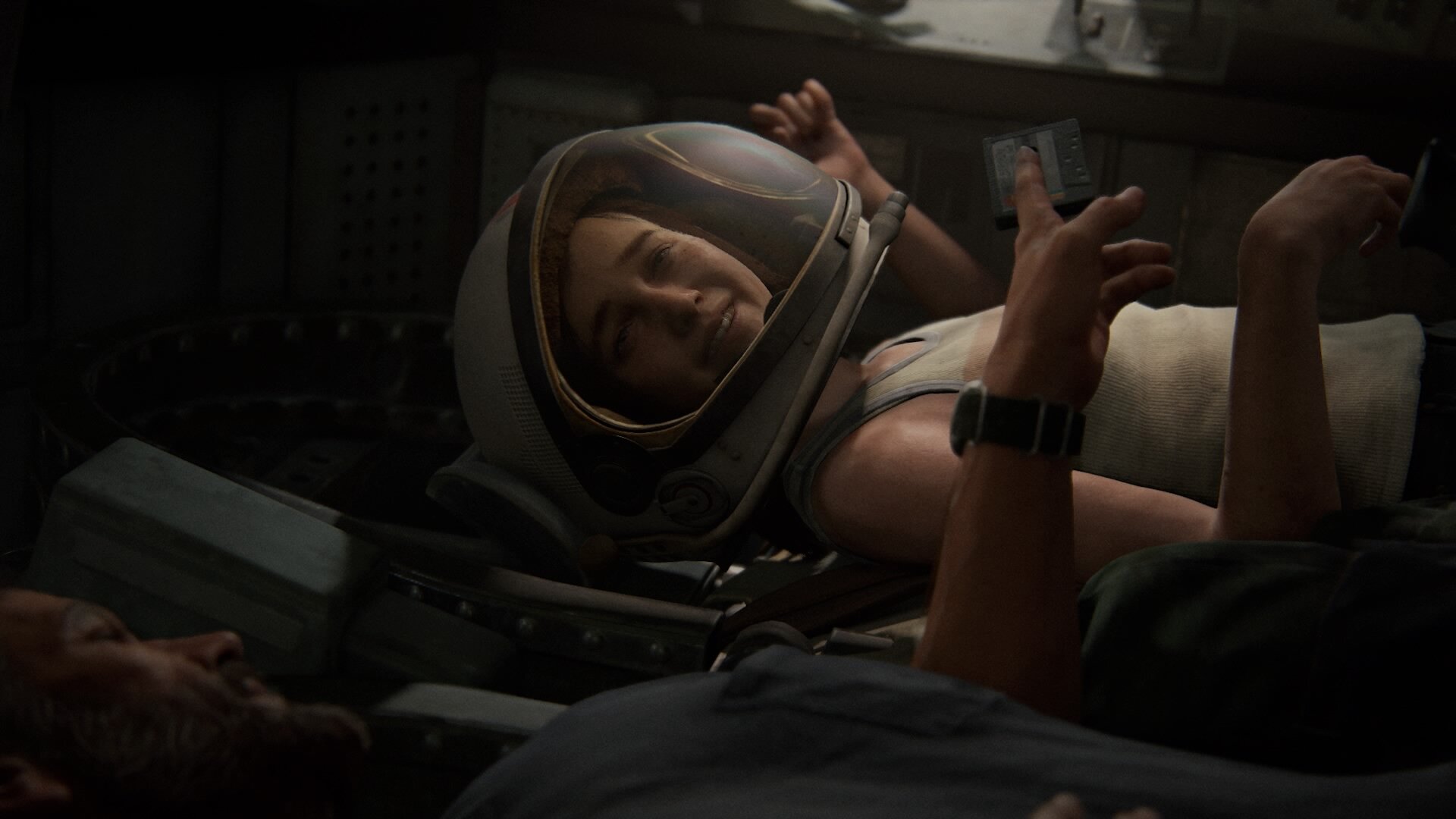Family Fucks You Up
by Christian Haines, Managing Editor
One of my favorite moments in Last of Us Part 2 is when you get to tour the Wyoming Museum of Science and History. It’s a flashback. There are no zombies. Instead, the game lets Ellie enjoy the museum’s space exploration and dinosaur exhibits. No shooting, no stealthy stabbing, just climbing the bones of a T-Rex and trying on astronaut helmets. What’s more, because it’s a flashback, Ellie gets to enjoy this visit in Joel’s company. In fact, the entire scene is a birthday gift from Joel to Ellie – a sweet and awkward gesture from a surrogate father to his adopted daughter: “Happy birthday, kiddo.” It’s a welcome reprieve from a game that sometimes seems to make Ellie little more than a murder machine. Yes, this is a game about revenge, but it’s also a game about family – about the bond of affection between father and daughter.
The outrage expressed by some fans in response to developer Naughty Dog’s decision to kill Joel off early in the game had partly to do with the way it shattered this family dynamic. Of course, there were plenty of toxic fans upset that the sequel to their favorite game replaced a straight man with a queer woman (or, as it turns out, multiple women and a trans man), but some fans’ feelings of betrayal also stemmed from a sense that the family that they had adopted as their own – that they felt they were a part of because of their journey as Joel in the first game – was being ripped apart. And they’re right: The Last of Us Part 2 does rip the family apart – and that’s what makes it so great! It dares to criticize an institution that just as often hands down trauma as affection. To paraphrase the poet Philip Larkin, families fuck you up, they may not mean to but they do.
If the first game crafts family out of death, despair, and giraffes, Last of Us Part 2 asks players why they’re so eager to preserve the family. The obvious answer is that family offers emotional and material support. It helps us overcome obstacles, survive danger (look out – clickers!), and hope for a better future. In the museum, Joel encourages Ellie to cherish her dream of space flight, giving her a tape with audio from a space shuttle launch. It’s a gesture that promises a world after the fungal undead – a world in which flying into space is once again possible. But there’s a more complex answer, too. It’s all too easy to ignore the fact that Joel and Ellie’s bond is forged from violence, that by the end of the first game, Joel’s primary way of relating to Ellie is by murdering whatever threatens her. Whatever one thinks of Joel’s decision to save Ellie from the Fireflies (and, perhaps, doom humankind to a slow zombie-fueled extinction), it’s hard to argue with the fact that Joel’s surrogate fatherhood mostly consists of violence. From one perspective, this might just be an effect of ludo-narrative dissonance. How do you tell an emotionally complex story using the gameplay verbs of dodge and shoot? From another perspective, however, this contradiction between violence and affection is family, or at least a version of fatherhood defined by toxic masculinity. Family fucks you up. It fucks you up by fucking other people up (all in the name of saving you from the harsh realities of the world).
Last of Us Part 2 reckons with the trauma of family. It sends players down a path in which the only thing they can do is suffer loss and inflict pain. There are no choices. For some reviewers, this lack of choice was a failure of the game, a sign of its inability to evolve from the first game. And they’re right, in a way. Last of Us Part 2 is, in many respects, the same game as Last of Us. Sure, there’s a jump button and you can go prone, but even the game’s inventive narrative structure – twin plot lines in which you play as both the protagonist (Ellie) and the seeming antagonist (Abby) – results in more sameness. Paradoxically, what’s different about the game is that it gives you two perspectives on the same thing: losing your father and trying to fill in that loss by inflicting it on others. If you’re looking for a satisfying ending – maybe a family reunion – you’re not going to find it, here. Instead, pressing buttons on your PlayStation controller means watching Ellie and Abbie repeatedly ruin their chances at happiness in the name of their fathers.
But Ellie and Abby’s failures aren’t Naughty Dog’s. Last of Us Part 2 succeeds because it destroys the family, or more accurately, because it asks questions about how family fucks you up. The most powerful moment in the game isn’t when Ellie and Abby walk away from each other on the beach in Santa Barbara, finally letting go of their quests for revenge. It’s when Ellie comes home to an empty house and tries to play her guitar, after having lost most of a finger in her final fight with Abby. The dissonant sound that comes from the guitar deflates any lingering hope for some satisfying reconciliation. I loved that scene in the museum; it made me feel good – it made me feel hope. The last third of the game, especially after Ellie leaves behind her new family (her partner Dina and their son JJ), is a slog. It’s repetitive. Its enemies are caricatures. It doesn’t add anything to the game, except a painful sense that there’s no healing Ellie’s trauma. It doesn’t take an apocalypse to fuck you up. Sometimes family is enough.





